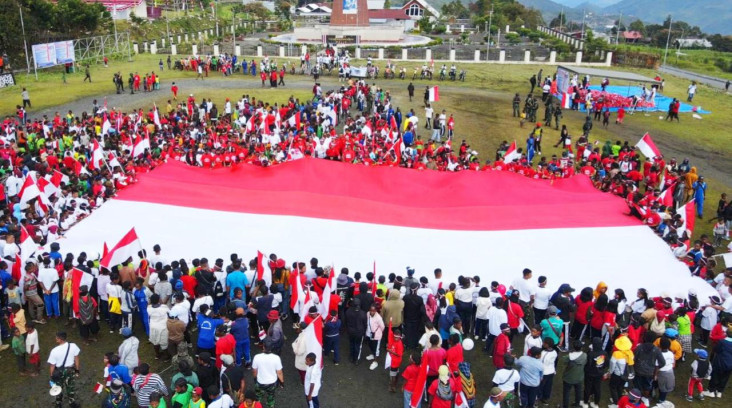Papua, with its extraordinary natural and cultural wealth, is an integral part of the Unitary State of the Republic of Indonesia (NKRI). However, its long history has also been marked by various challenges, including political and social differences. Amidst these differences, many inspirational stories have emerged about how unity brings positive change to the people of Papua.
Unity as the Key to Progress
Unity is the foundation for building a more advanced and prosperous Papua. When people unite, they can work together to improve education, the economy, and social welfare. Several real examples demonstrate how unity has brought significant change:
1. Joint Education Program
In some remote areas of Papua, communities have initiated small schools through mutual cooperation. Due to limited teaching staff, young people and housewives have stepped in to teach children how to read and write. As a result, school participation rates in these areas have increased, and more children now receive basic education.
2. Local Entrepreneurship Communities
In regions such as Wamena and Timika, people have formed business groups to produce and sell traditional Papuan handicrafts, such as noken bags and wooden carvings. With a spirit of togetherness, they support each other in marketing and production, thereby improving the local economy.
3. Peaceful Villages
Several villages in Papua have adopted the concept of “Peaceful Villages,” where people from different ethnic and religious backgrounds live harmoniously. They build places of worship side by side and work together to maintain security in their communities.
Inspirational Figures: Papua’s Role Models for Unity
1. Frans Kaisiepo
Frans Kaisiepo, born in Wardo, Biak, on October 10, 1921, played a crucial role in uniting Papua with Indonesia. As the fourth governor of Papua, he was a fearless hero in resisting Dutch rule over Papua.
2. Machmud Singgirei Rumagesan
Machmud Singgirei Rumagesan was the King of Sekar and a pro-integration activist from West Papua. He founded the Cenderawasih Revolutionary Movement for West Irian (GTRIB) in 1953 and later became a member of the Supreme Advisory Council in 1959. On November 10, 2020, he was posthumously recognized as a National Hero of Indonesia for his lifelong efforts to unite West Irian with Indonesia.
Expert Opinions on the Importance of Unity in Papua
Experts from various fields provide insights into how unity serves as the foundation for a more developed and prosperous Papua:
1. Anthropological Perspective
• Clifford Geertz, a renowned anthropologist, explained that religion and culture play a significant role in building a harmonious social structure. In Papua, cultural and religious structures can serve as effective tools for unity.
• Prof. Dr. M. Ikhsan Tanggok, an Indonesian anthropologist, stated that Papua’s rich culture can be adapted to modernity to create a harmonious social life.
2. Sociological Perspective
• Dr. Bambang Shergi Laksmono, a sociologist from the University of Indonesia, believes that social development in Papua must be based on community participation. He emphasized that involving residents in development fosters a sense of ownership and enhances social stability.
• Dr. Ratna Megawangi, a social expert, mentioned that character education based on local culture is a crucial tool in strengthening unity and reducing social conflict in Papua.
3. Religious and Social Life Perspective
• Franz Magnis-Suseno, a philosopher and theologian, stressed that religious teachings play a major role in building unity. He highlighted how values of love and togetherness in religious teachings can be applied to Papuan society.
• Toni Wanggai, Chairman of PWNU Papua, emphasized that interfaith harmony in Papua is a valuable social asset in building peace and unity in the region.
Real Stories: Voices from Papua
Beyond well-known figures, there are many inspiring stories from everyday Papuans that highlight the importance of unity:
1. Marta: A Fighter for Education in Remote Areas
Marta, a Papuan woman, successfully established a school in her village despite very limited resources. “I believe education is the key to building Papua. That’s why, even with so little, I decided to build this school,” Marta said with great enthusiasm.
2. The Red and White Kitchen Team: Spreading Goodness in Papua
Papua’s breathtaking beauty has set the stage for acts of kindness carried out by the Red and White Kitchen Team. They travel to various regions in Papua to spread messages of peace and togetherness.
Unity is the key to building a better future for Papua. By working together, respecting differences, and strengthening community bonds, Papuans can create a peaceful and prosperous society. The stories of inspirational figures, community initiatives, and real-life experiences all prove that unity is not just an ideal but a tangible force that drives progress and harmony in Papua.










